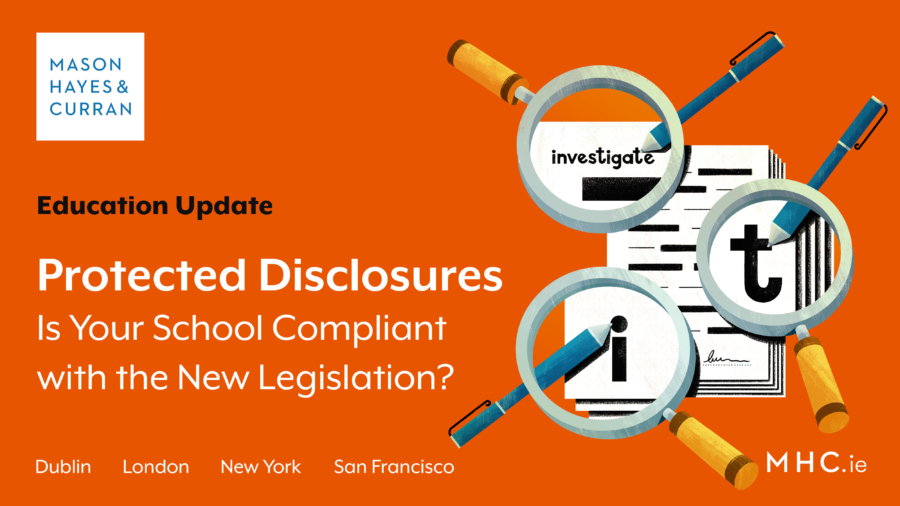
Whistleblowing legislation is here. With it brings the necessity for schools in Ireland to be fully aware of new obligations requiring robust processes and procedures which allow school employees to make protected disclosures. Our Education team looks at the main aspects of the Act and how internal reporting processes and channels should be designed and implemented in your school to ensure compliance with the Act.
The Protected Disclosures (Amendment) Act 2022 (the 2022 Act), which came into effect on 1 January 2023, transforms the legal landscape of protected disclosures often referred to as “whistleblowing”. The 2022 Act significantly expands the scope of the protections for those who make protected disclosures. The legislation places new and enhanced obligations on schools as public bodies to have processes in place to facilitate workers in making protected disclosures.
Substantial changes to the Protected Disclosures Act 2014 (the 2014 Act) were required for Ireland to comply with EU law as it relates to protected disclosures. The 2022 Act amends the 2014 Act in this regard. Therefore, it is important for school Boards of Management as employers to familiarise themselves with the changes introduced by the new legislation.
Who is protected under the 2022 Act?
The Protected Disclosures Act 2014 applies to disclosures made by “workers” of relevant information that came to that worker’s attention in connection with their employment. Workers are defined in the 2014 Act as including employees, ex-employees, consultants, agency workers; essentially anyone who is contracted to provide work for an employer in the public or private sector. The 2022 Act significantly expands the group of people protected disclosure legislation would apply to. The definition of “worker” in the 2022 Act includes:
- Employees
- Consultants
- Agency workers
- People engaging in work experience
- Shareholders
- Volunteers
- Individuals who are members of the administrative, management or supervisory body of an undertaking
- Prospective employees involved in the recruitment process
What is a protected disclosure?
Under the 2014 Act, a protected disclosure is the disclosure by a worker of relevant information that came to their attention in connection with their employment, and which they reasonably believe tends to show one or more relevant wrongdoings. The definition of relevant wrongdoing contains eight types of wrongdoing. These include:
- That an offence has been or is likely to be committed
- That a person has failed, is failing or is likely to fail with a legal obligation, other than one arising from a contract of employment, and
- That the health or safety of any individual has been, is being or is likely to be endangered
The 2022 Act changes the definition of relevant wrongdoing in a number of ways. The first is that it will include breaches of EU law in a number of areas including:
- Public procurement
- Financial services, products and markets, and prevention of money laundering and terrorist financing
- Product safety and compliance
- Transport safety
- Public health
- Protection of privacy and personal data, and security of network and information systems
- Breaches that otherwise affect the financial interests of the EU or defeat the purpose of EU law
Secondly, instead of the information needing to have come to a worker’s attention in connection with their employment, it can now also come to their attention “in a work-related context”. While this may seem like semantics, it is necessary to ensure that persons such as volunteers and job applicants are protected from penalisation.
The third change to the definition arises largely as a result of the December 2021 Supreme Court decision in Baranya v Rosderra Irish Meats Group Ltd. In that case, it was found that a complaint made by an employee about an issue which was personal to him but concerned workplace health and safety, which places statutory obligations on employers, could be considered a protected disclosure under the 2014 Act. As a result of this finding, the 2022 Act amends the definition of relevant wrongdoing to exclude “interpersonal grievances exclusively affecting the person making the disclosure”.
Complaints by a worker that concern interpersonal grievances between themselves and another worker, or their employer, will not constitute a protected disclosure. As a result, these complaints will instead be dealt with through other channels such as agreed grievance procedures. This is a significant change in the education sector.
What is penalisation under the 2022 Act?
One of the protections that whistleblowers have under the 2014 Act is protection from being penalised for having made a protected disclosure. Penalisation is defined in the 2014 Act as including actions such as: suspension, lay-off, dismissal, demotion, intimidation, harassment, discrimination or threat of reprisal. The 2022 Act includes an expanded definition of penalisation so that it would include actions such as:
- Withholding of training
- A negative performance assessment or employment reference
- Harm, including to the worker’s reputation, particularly in social media, or financial loss, including loss of business and loss of income
- Blacklisting on the basis of a sector or industry-wide informal or formal agreement, which may entail that the person will not, in the future, find employment in the sector or industry
- Early termination or cancellation of a contract for goods or services
- Cancellation of a licence or permit, and
- Psychiatric or medical referrals
The 2022 Act provides that if an employee makes a claim of penalisation to the Workplace Relations Commission (WRC), any of the above actions will be deemed to have been a result of them having made a protected disclosure, unless the employer proves that the act or omission was based on duly justified grounds.
What policies and procedures will employers need to put in place?
One of the changes introduced in the 2022 Act is the requirement that public bodies, which include recognised schools, maintain and operate internal reporting channels and procedures for the making of protected disclosures. Suitable documented procedures and reporting lines must also be maintained for the purposes of follow-up with the person who made the protected disclosure, the reporting person, after they have made the disclosure. These new requirements include:
- Establishing reporting channels and procedures for protected disclosures
- Providing workers with clear and easily accessible information about these procedures
- Designating a person, department or third party to receive protected disclosures.
- Designating a person or department, that can be the same as above, to diligently follow-up, maintain communication and provide feedback to the reporting person
- Acknowledging receipt of a protected disclosure within seven days
- Providing feedback to the reporting person within a reasonable period, being not more than three months from the date the acknowledgement of receipt of the report
Putting in place and operating reporting and disclosure channels puts an onerous burden on schools as employers and will require resources, time and training. In that regard, it will be important to consider as a first step updating, or putting in place, a whistleblowing policy for your school.
Anonymous reporting
Under the 2022 Act there is no obligation on schools to accept and follow up on anonymous reports. However, where a school does accept an anonymous report and where a worker’s identity subsequently becomes known, the protection against penalisation will extend to them.
Conclusion
Understanding the type of complaint or disclosure which can constitute a protected disclosure, together with those which do not, is central to successfully managing disclosures in the workplace.
Schools need to take action now to become fully aware of the provisions of the 2022 Act to ensure that they have in place procedures which comply with the requirements of the legislation.
For more information and expert advice on ensuring your school is fully compliant please contact a member of our Education Law team.
The content of this article is provided for information purposes only and does not constitute legal or other advice.
Share this:




